How long have you been thinking to start a Facebook community group or a Discord community?
You might be wondering, how does this guy know about this? Well, I have been there. I wanted to create and start a Facebook group around my authority blog forever.
The chances are, some of you own e-commerce stores, SAAS companies, and digital marketing agencies. That’s why establishing a community of fans seems an integral part of your social media marketing strategy.
Don’t worry because you’ll check the box of creating a Facebook group on your to-do list real soon. Since I have been an active member of several Facebook groups, so I know what it takes to build a community of fans.
It’s not a problem if the term “Facebook Group” hasn’t immediately struck a chord as we have seen marketers rave about the downfall of the Facebook Pages organic reach for the longest time. To put things in perspective, let me share that Facebook groups are nothing like Facebook pages.
A lot of marketing experts had already seen writing on the wall and they started spreading their audience across multiple platforms. If you’re curious about Facebook Groups, then I must say keep digging it. It’ll turn things around for you, especially if you want to leverage social media.
We all have seen how TikTok and Clubhouse took the world by storm. Are we in the midst of seeing a major change on the social media scene? I’m not sure about it, but I think that the social media domination isn’t limited to Facebook, Twitter, LinkedIn, and YouTube anymore.
Let me tell you right off the bat, I want to share tips, tricks, and strategies for establishing a community of die-hard fans using the Facebook group. So it doesn’t matter whether you have a blog, business, or personal brand; a social media community is a must-have thing for any type of online business model.
Allow me to shed some light on the importance of having an online community.
Why You Should Have a Community Around Your Brand
Since companies are paying close attention to SEO, content marketing, and paid advertising, so the competition seems to be getting fierce in some niches. Therefore, both blogs and brands need alternative ways to get and retain the attention of the audience.
Creating a Facebook group could provide an opportunity to gather like-minded people under the same umbrella.
Here are three main reasons why building a community around your brand is a must:
- Brand AwarenessBrand awareness refers to the extent to which customers can identify or recall the brand. An engaged and active community brews discussions, debates, and opinions, which solves the audience’s problems and helps companies develop brand awareness.
- Customers AssistanceA community of followers and customers where provides a platform for people to interact with each other, it also gives an avenue for the brand to respond to the queries of the audience. In some active Facebook groups, people often provide a helping hand to each other, which makes customers’ assistance a lot easier.
- Prospective EngagementOne of the key benefits of building a community around a brand is that it attracts new eyeballs and brings new people closer to the brand. For example, new people discover YouTube channels or Facebook groups of companies and get to know more about the business.
It’s only possible when you have a vibrant and effective community around your brand. Seemingly, the Facebook group is one of the best tools for creating an online community on the internet or social media.
You can’t create a Facebook group on a whim and expect it to grow and succeed. Therefore, understanding the following steps would ensure that you convert a Facebook group into a community of fans.
A Step-by-Step Guide on Establishing a Community of Fans Using a Facebook Group
Let’s take a look at the key steps involved in creating a Facebook community page of raving fans:
#1: Define the Group Purpose
It’s important to comprehend the idea that you aren’t starting any Facebook group, but in fact, you’re going to create Facebook community. Therefore, some due diligence is required before going ahead with it.
Facebook Group is essentially a tool or platform to build a community. You must pay close attention to the essence of establishing a Facebook community of true fans. Hence, defining the group’s purpose is vital in this regard.
Three fundamental things are key to defining the group’s purpose:
I. About:
The about section explains what the group is all about. It should be brief and to-the-point so that people could read it easily. Often, people chicken out when they came across lengthy sections on the websites and apps.
II. Branding:
Everything that differentiates your brand from others is branding. A Facebook group must have a relevant name and an attractive cover banner, so that people could identify your Facebook group.
III. Rules:
Facebook gives an excellent feature of creating Facebook group rules to the admin. Rules help admins and moderators manage the group and help explain to the members that what they can and what they can’t do in the group.
A lot of Facebook users join in groups to share their blog posts or video links. They want to milk the opportunities as soon as they join in or get accepted into the group. It’s nearly impossible to create a public Facebook group and don’t get spam posts. Therefore, a check and balance is a must.
The reason behind some due diligence beforehand is that you must have a direction in your mind regarding your group. For instance, if you have a web design agency and you’re the founder of a blog as well. Even though you own both these entities, but it won’t be wise to create a community page on Facebook for both entities. You have to have different groups, let alone different agendas for both groups.
The more you pay attention to the purpose of the Facebook group, the easier it’ll be to start and manage the group.
#2: Set Up the Facebook Group
A lot of us started using Facebook a decade ago and no wonder some of us created Facebook pages and Facebook groups that make no sense. It’s also a possibility that you haven’t had a chance to try out such features on Facebook.
Let’s cut to the chase. I’ll help guide you on creating and starting a Facebook group that could potentially become a healthy Facebook community around your blog or brand.
Once you’ve logged in to your Facebook account. Go to the Groups section and find the “create new group” option to get started with your Facebook community.
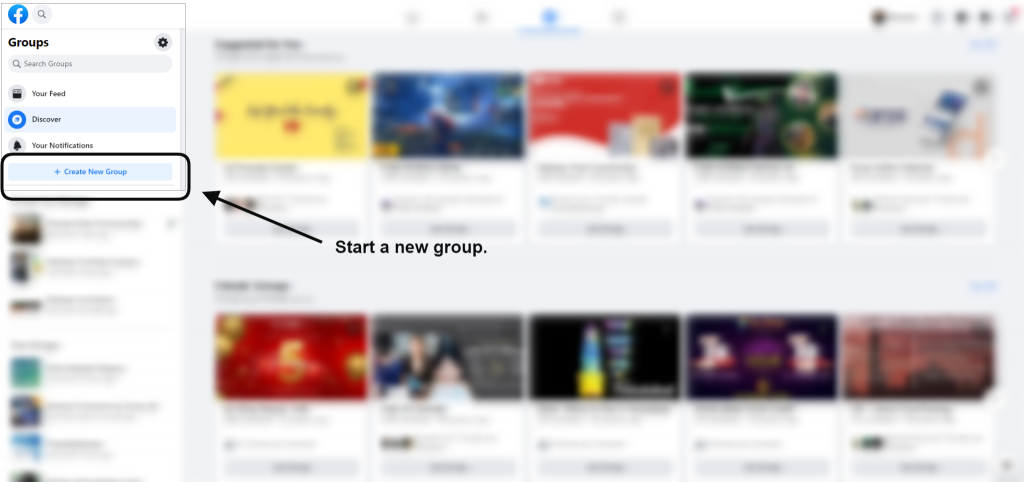
I don’t want to spoon-feed you with how to create a Facebook group because if you’ve made a Facebook account, you can surely create a Facebook group as well.
However, I want to reiterate the fundamentals of setting up a Facebook group that would essentially help in turning a Facebook group into a community.
Here are three basic elements of setting up a Facebook group:
I. Choosing the Facebook Group Type:
The first and foremost thing a group maker should do is to choose the type of group they want to setup. They can choose between a private and a public group. There used to be a third type called secret group which Facebook removed a few years ago.
II. Defining the Facebook Group Rules:
The group rules may not be a prerequisite for setting up a group, but almost every Facebook group has some rules defined. Such ground rules help moderators and admins in managing the discussions and content sharing in the content.
III. Doing the Group Branding:
Branding creates distinction and clarity. Consider choosing a unique and precise name for your Facebook group and create a cover banner that helps people understand the purpose of the group.
Setting up a Facebook group is as easy as the next thing, but if there is no motivation and purpose behind the launch of the Facebook group, it would fade away after a while.
One of the reasons Facebook groups fail is that admins or members forcefully add people to the Facebook groups without their consent. As a result, they either leave the group after some time or they never participate in the discussions. Therefore, the best way to bring people into the group is to tell them what happens in the group or how it has been helping the community.
#3: Invite Moderators to the Group
Once things start to roll in the group, one of the things you should do is to invite people to do the group moderation with you. Let me admit that it’s not possible to run a Facebook group all by yourself.
I have had some experience of creating a small group of under 200 members, and I appointed two group moderators to help me out. What happened was that I asked them and they happily agreed to play their role in the group management.
If you’re just getting started with your Facebook group, you may not feel like adding moderators to the group. Eventually, they’d be a helping hand when the Facebook community gets bigger.
To make someone the moderator of your Facebook group, you must first talk to the person privately. If the person agrees to become the group moderator, then you can appoint them as a moderator.
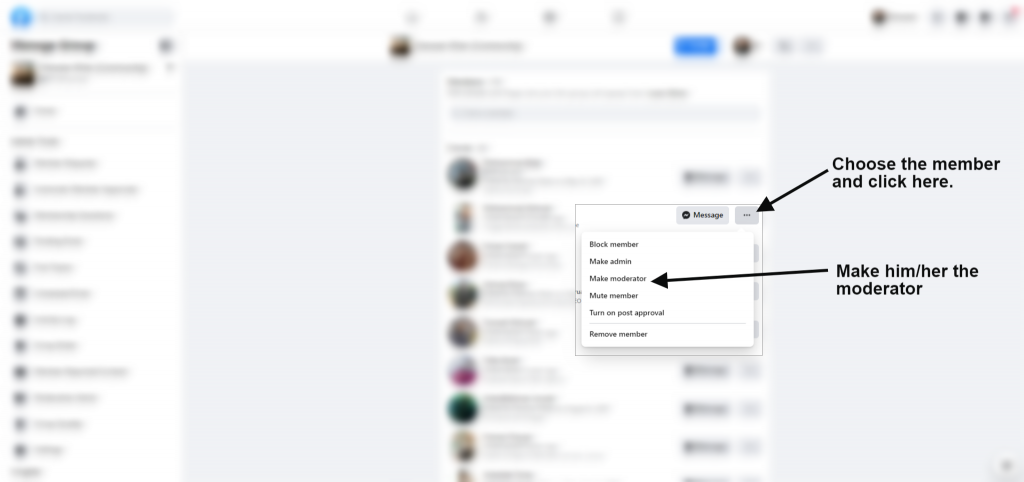
To make someone the group moderator, go to the members’ list and click on the three-dot button along with the message button against their name, and then click on the “make moderator” option. Once you click the “make moderator” option, you can then send an invitation to the respective member to be a part of the group management.
For more details on creating admins or moderators for your Facebook group, read this guide from Facebook.
#4: Highlight the Facebook Group
When you create a private Facebook group, it may grow organically through the Facebook algorithm just like any public group depending upon the engagement, SEO, and branding.
However, it’d also need an external push, so let explain what I mean by it: creating a Facebook group isn’t enough, so be ready to spread the word about it. Otherwise, how people would find out about it.
It doesn’t mean you have to spam every Facebook friend’s inbox with your group’s link. Instead, you can simply highlight the Facebook group’s link wherever it’s possible.
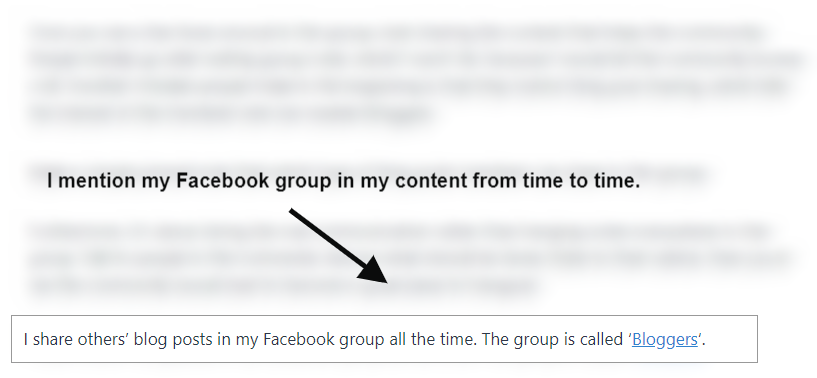
Don’t panic; I’ll pinpoint the places where you can highlight your Facebook group’s link and then you’re all set to publicize your Facebook group without being pushy.
Following are the areas where you can highlight your Facebook group’s link:
Website:
doesn’t matter whether you have a blog or a business website, you can add your Facebook group’s link next to your social media icons.
Blog content:
The blog content is vital to highlighting your Facebook group and inviting people to your group. Providing with your group’s link is far better than forcefully adding people to the group.
Video descriptions:
Video description is one of those places where people look out for additional information and resources after watching the video. So you can cash in on this opportunity by adding Facebook group’s link in YouTube, Facebook, LinkedIn, and IGTV videos.
Podcast Shownotes:
Every podcaster adds podcast show notes in which they mention their social media links. Plus, they also mention additional resources or podcast guest’s links in the show notes. You can add the Facebook group’s link to your podcast show notes.
Facebook Page:
Since Facebook allows you to interconnect your Facebook page and Facebook group, you can let your Facebook page fans find your Facebook group by linking your page to the group.
Furthermore, these aren’t the only areas to highlight your Facebook group. You can make the most of your WhatsApp, Twitter, Facebook, and Instagram profile bios for highlighting your Facebook group’s link.
#5: Content Publishing Strategy
A Facebook group or any other community won’t last if it’s not helping the audience. The usefulness of the Facebook group plays an integral role in its success. So don’t hesitate to add several things to your content publishing strategy.
Usually, public Facebook groups that don’t have any rules or check-and-balance become irrelevant rather quickly. The reason is that members don’t get value out of them because of the lack of attention of the audience. It all happens due to the spam posting in the group.
On the contrary, some Facebook groups remain active, productive, and useful for a longer period just because of the strict rules and regulations. What happens is that people get used to following the group rules once they are applied and followed by everyone.
The point is that if you want to build a community of fans using a Facebook group, then pay close attention to making the group effective.
Here are four content publishing ideas for starting a conversation in the group:
- Encourage discussions:When people privately ask me a question, I often refer them to my Facebook group, and tell them to ask in the group. This way, group members get to see the question and respond to the question. Not only does it introduce my Facebook group to a new person, but the person also receives multiple answers from members.
- Scheduled Posts:Facebook groups do have a scheduled post feature available. Use that feature for scheduling future group posts. I have used the “scheduled posts” feature before traveling out of town, especially when I knew that I won’t be able to access the internet for a day or two. Scheduling group posts helps you put out content even when you’re away.
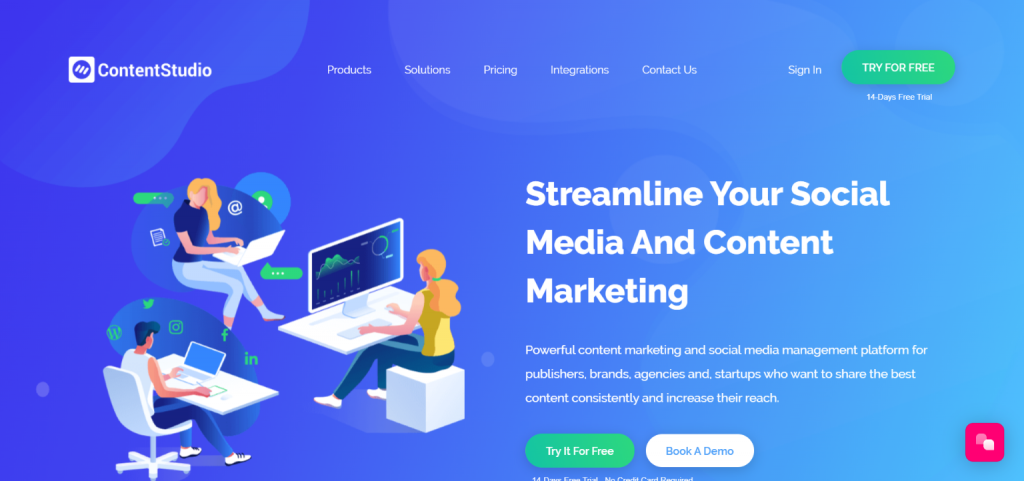
ContentStudio is my favorite tool for social media management and content scheduling. One of the best features of ContentStudio is that it allows you to schedule content/posts stories for Facebook groups as well.
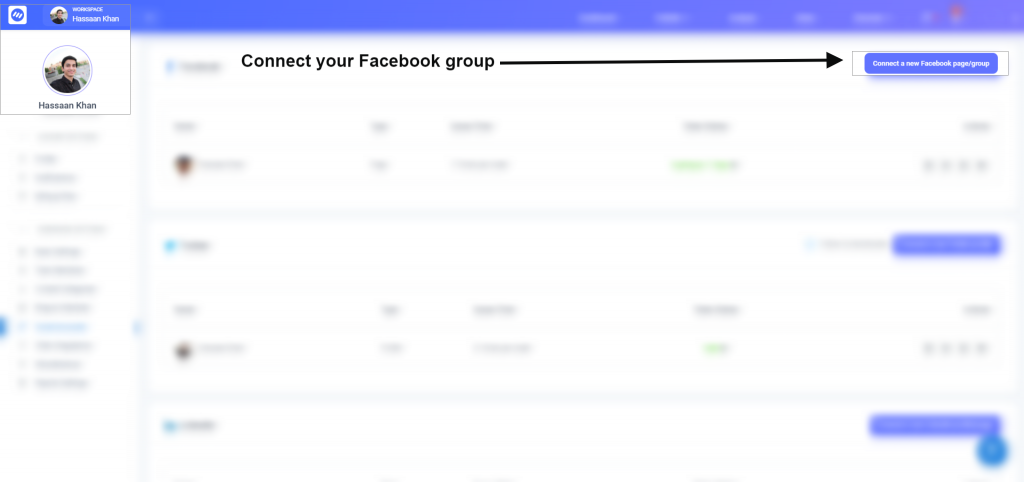
3. Link Sharing Policy:
Zero tolerance against link spamming is essential to maintaining the quality of posting in the group. However, if you don’t allow genuine members to share useful links, it may also negatively affect the group. So you’ll be better off creating a link sharing policy and mention in the group rules to elaborate on how and when they can share a link.
4. Questions and Answers:
If you want to increase the engagement in the Facebook group, then encourage or host questions and answer sessions. You can even go live or invite an expert guest to come to live in the group to answer group members’ questions. Furthermore, members should be encouraged to ask questions freely in the group.
Group’s mission and branding won’t matter if there is no content plan for the group. It does seem like a difficult job to pull off, but it’s not that difficult. If you’re crystal clear about the purpose of the group and bringing the right people into the group, you won’t have to worry about them breaking the ice for discussions.
How Would You Establish a Community Using the Facebook Group?
Look, we aren’t just preaching these tips and tricks. We do believe in all this.
ContentStudio has its own Facebook group of over 5,000 members.
The team at ContentStudio often jumps into the conversations and helps out the community.
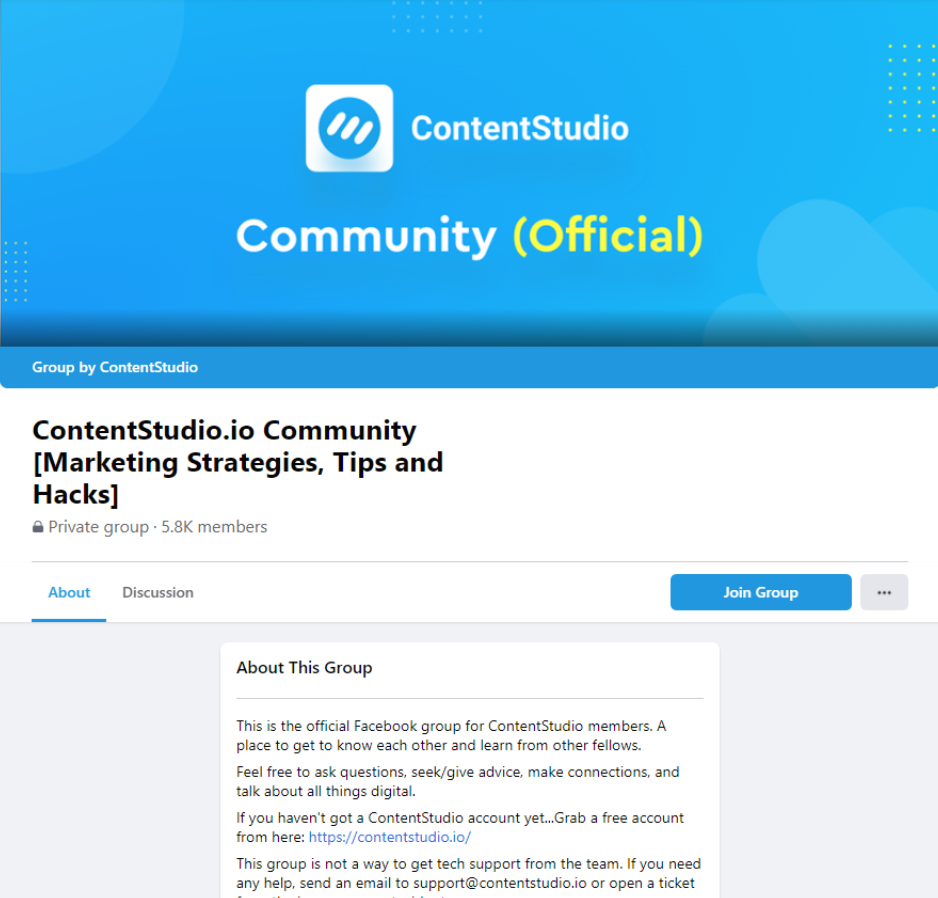
Anyway, I’ve shared five simple steps of establishing a community of fans using a Facebook group.
One of the core reasons for writing this piece was that people create Facebook groups all the time, but the majority of the groups fail. The reason some Facebook groups don’t take off is that the admins don’t have a clear mission in mind.
This is why I emphasized the group’s purpose the most; you can see the group’s purpose was on top of the list.
Furthermore, if you shift your focus on the numbers such as adding people directly to the group without their consent, it won’t matter much because they won’t be participating in the conversations anyway.
Instead, you should talk about your Facebook group and let them decide whether or not they should join the group. It’ll be far better if fewer but right people join in and actively participate in the discussions.
I’ve tried to explain what makes a Facebook group succeeds so that you could establish a community of fans the right way.
Now it’s your turn to answer this:
How would you establish a community of fans using the Facebook group?
